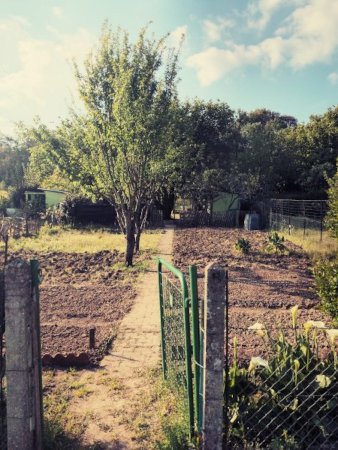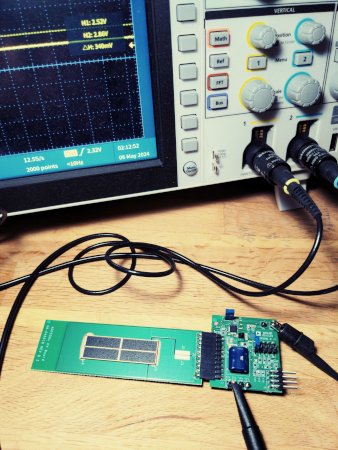Spring is here. After a long wave of April showers, I’m now very pleased to announce that the garden plot I was allocated a month ago is going well and a few shoots are starting to show up. Equally importantly, I’ve finally established the framework for my upcoming work initiatives. It’s a steep climb, almost vertical, although a very rewarding one. Steady progress eventually leads to new heights and can open new horizons.
Overview
Essentially, micro-entrepreneur is a French flavour in the self-employed category with simplified procedures. So I’m open for business, officially since 1st May 2024. That’s for the status, but what about the actual work?
First of all, I’ll carry on doing open-source software development in the foreseeable future.
Secondly, I’m kickstarting some R&D in the field of renewable energy which should start bearing fruit over the coming months.
Lastly, a few extra activities may also come into play such as designing hardware kits, running workshops and education.
I’d like to take the opportunity here to include a section in French since I now live in Tours. It’s basically a summary of the English parts.
En Français

Jardin familial / Allotment plot
Après avoir vécu pendant quinze ans au Royaume-Uni, j’ai découvert beaucoup de choses changées à mon retour en été 2022. Je ne conaissais pas ameli.fr, j’ai dû faire beaucoup de démarches souvent lentes, manuelles et via divers organismes isolés. J’ai pourtant eu la chance de pouvoir garder mon emploi à distance avec mon employeur, ce qui m’a grandement simplifié la tâche. Malgré tout, j’ai finalement décidé de franchir le cap et commencer ma nouvelle activité en freelance ce 1er Mai 2024.
Il y a de quoi écrire de longs articles sur les différences de cultures ainsi que sur les procédures administratives. Je me limiterai ici au fait que le prix du vin en France est comparable à celui de la bière en Angleterre, et à une liste des étapes principales pour démarrer une entreprise individuelle: choix du statut, solution de domiciliation, définition des activités & business plan, formulaires INPI, assurance RC Pro, compte bancaire…
Mais venons-en au sujet principal. Prendre le temps de faire une pause profesionnelle permet de revoir ses priorités et redonner du sens à son activité. C’est aussi l’occasion de rétablir un équilibre avec sa vie personelle, surtout après un changement important de situation. Quelles conclusions en ai-je donc tirées?
Il me semble qu’être prêt à s’adapter aux changements rapides est devenu la priorité. Cela se traduit dans mon cas à choisir certains domaines et y déveloper une base pour catalyser des opportunités futures - dont certaines déjà en vue. Concrètement, après vingt années de dévelopement logiciel et particulièrement du libre, il est naturel que je poursuive dans cette voie: noyau Linux, devops, Web3… Entre temps, une passion qui n’a pas cessé de m’animer depuis mes études d’ingénieur en électronique se retrouve maintenant en plein essor: les énergies renouvelables. C’est donc mon second terrain d’action, plein de potentiel comme j’ai pu en témoigner à FOSDEM.
Une autre façon de valoriser son expérience est de la partager, en particulier par le biais de l’enseignement: interventions en milieu universitaire, ateliers, tutoriels… C’est aussi un bon moyen en tant que travailleur indépendant pour créer des connexions et être actif dans une communauté, tant à l’échelle locale qu’à distance. Un atout supplémentaire dont je bénéficie est la possibilité de le faire en anglais.
Strategy
Of course, it’s hard to predict exactly how things are going to pan out. The overall strategy at this stage is to focus on a number of particular areas to prepare the ground for longer-term opportunities - with a couple already in sight.
Taking the time to slow down during a career break makes it possible to reflect upon personal priorities and renew a sense of purpose. This is true for every aspect of someone’s life such as family and health, but let’s focus on work for now. Seven years ago, a similar approach led me to invest fully into open-source software when I joined Collabora. The stakes are very high today with so many disruptive events reshaping the world. Renewable energy is finally receiving massive amounts of interest while artificial intelligence is also taking off exponentially. How to deal with such macroscopic things as an individual?
Software
Given my past experience in open-source software consultancy, it’s only natural that I keep this momentum going. The big difference now is that I can open up new avenues. To start with, I’ll resume actual Linux kernel development and most likely extrapolate from some of the devops automation work I did around KernelCI to other use-cases. I’m also fully learning the Rust language, diving deeper into machine learning technicalities and investigating Web3 technologies such as Polkadot.
Software is everywhere though, and the next main application domain I want to focus on is energy.

Photovoltaic harvesting devkit
Energy
Exactly twenty years ago, in 2004, I was answering a particular question while filling an entry questionnaire for my MEng electronics degree about career aspirations. In my case, it was all to do with renewable energy and contributing to a more sustainable future. While it was probably seen more as a niche or nerdy activist idea back then, we’ve now come a long way.
It’s so exciting to be able to put into practice all my dormant hardware skills on top of the software ones: power electronics, automation, sensors, signal processing… And since open-source concepts have now become mainstream too, as witnessed at the FOSDEM Energy devroom there’s a lot to be done both in software and hardware to reinvent this century-old industry with open standards.
Likely topics for some future blog posts are going to be micro-grids, electrical substations, machine learning applied to energy production and transport, software tooling at every level of the stack and hardware kits. But that’s enough buzzwords for today.
Connecting the dots
Another important aspect of freelancing is communicating and engaging with social networks. While working remotely, some typical means to achieve this would be taking part in conferences and events which can be online or face-to-face, writing articles and creating educational material such as tutorials.
Other ways to reach out to new communities would of course be contributing technical value (code, design, discussions…) but also teaching and running workshops. One particular way for me to put my experience to good use in France would be via meetups in English around tech topics, and lectures.
As always, you’re more than welcome to get in touch and share any thoughts you might have via email.
Speak soon!
Last modified on 2024-04-21